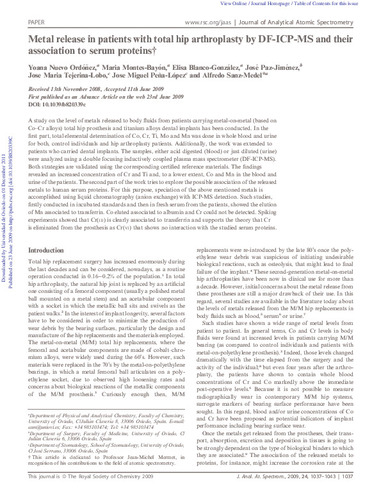Metal release in patients with total hip arthroplasty by DF-ICP-MS and their association to serum proteins
Palabra(s) clave:
Biochemical, Blood, Double Focussing Spectrometer, Inductively Coupled Plasma/Ms, Trace Analysis, Urine.
Fecha de publicación:
Versión del editor:
Citación:
Descripción física:
Resumen:
A study on the level of metals released to body fluids from patients carrying metal-on-metal (based on Co–Cr alloys) total hip prosthesis and titanium alloys dental implants has been conducted. In the first part, total elemental determination of Co, Cr, Ti, Mo and Mn was done in whole blood and urine for both, control individuals and hip arthroplasty patients. Additionally, the work was extended to patients who carried dental implants. The samples, either acid digested (blood) or just diluted (urine) were analyzed using a double focusing inductively coupled plasma mass spectrometer (DF-ICP-MS). Both strategies are validated using the corresponding certified reference materials. The findings revealed an increased concentration of Cr and Ti and, to a lower extent, Co and Mn in the blood and urine of the patients. The second part of the work tries to explore the possible association of the released metals to human serum proteins. For this purpose, speciation of the above mentioned metals is accomplished using liquid chromatography (anion exchange) with ICP-MS detection. Such studies, firstly conducted in incubated standards and then in fresh serum from the patients, showed the elution of Mn associated to transferrin. Co eluted associated to albumin and Cr could not be detected. Spiking experiments showed that Cr(III) is clearly associated to transferrin and supports the theory that Cr is eliminated from the prosthesis as Cr(VI) that shows no interaction with the studied serum proteins.
A study on the level of metals released to body fluids from patients carrying metal-on-metal (based on Co–Cr alloys) total hip prosthesis and titanium alloys dental implants has been conducted. In the first part, total elemental determination of Co, Cr, Ti, Mo and Mn was done in whole blood and urine for both, control individuals and hip arthroplasty patients. Additionally, the work was extended to patients who carried dental implants. The samples, either acid digested (blood) or just diluted (urine) were analyzed using a double focusing inductively coupled plasma mass spectrometer (DF-ICP-MS). Both strategies are validated using the corresponding certified reference materials. The findings revealed an increased concentration of Cr and Ti and, to a lower extent, Co and Mn in the blood and urine of the patients. The second part of the work tries to explore the possible association of the released metals to human serum proteins. For this purpose, speciation of the above mentioned metals is accomplished using liquid chromatography (anion exchange) with ICP-MS detection. Such studies, firstly conducted in incubated standards and then in fresh serum from the patients, showed the elution of Mn associated to transferrin. Co eluted associated to albumin and Cr could not be detected. Spiking experiments showed that Cr(III) is clearly associated to transferrin and supports the theory that Cr is eliminated from the prosthesis as Cr(VI) that shows no interaction with the studied serum proteins.
ISSN:
Identificador local:
20090398
DOI:
Colecciones
- Artículos [37538]
- Química Física y Analítica [639]
Ficheros en el ítem





